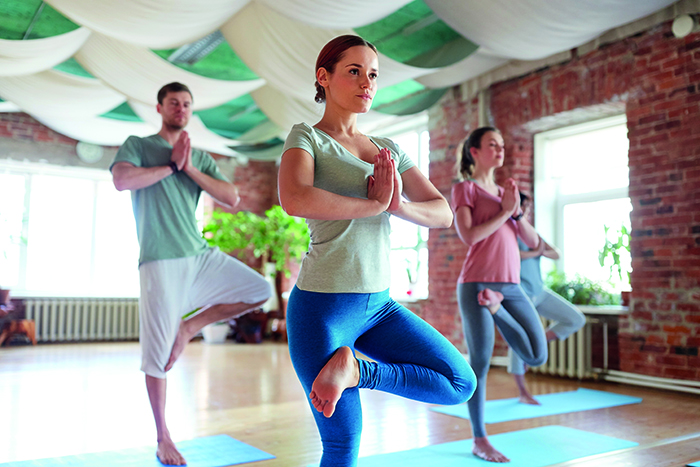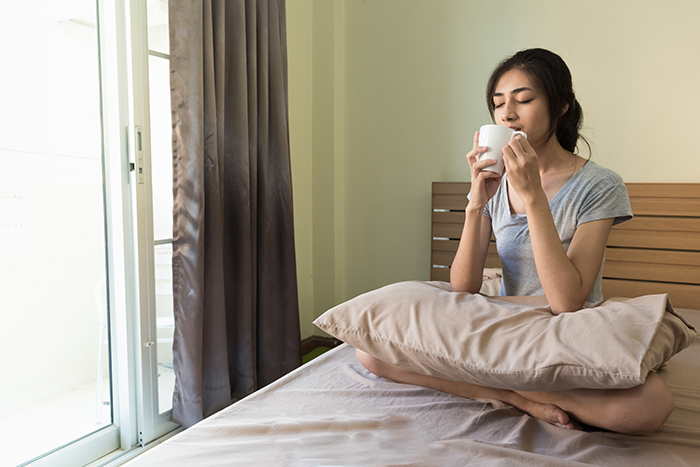It’s tough to find somewhere to turn without someone telling you that you should be feeling low today…
It’s so-called Blue Monday, the day when experts tell us we are at our lowest ebb, as Christmas is long gone, it’s still a long way to payday, and our new year resolutions are lying in tatters. But here at Top Sante we have been working hard to find you lots of ways to feel happy – one for each day of the rest of the month, in fact! So read on and discover our favourite tips and tricks to help you make this January your best yet.
Interest
One way to develop more of these feelings is to tap into something the Japanese call your ikigai, or ‘reason for living’. In new book The Little Book of Ikigai, Ken Mogi explains that one element of ikigai is experiencing the ‘joy of little things’. This could be being somewhere that makes you happy, spending time with someone you love or doing something you truly enjoy
Inspiration
‘Inspiration is that feeling in your heart that says “I just need to…”,’ says creative and empowerment coach Kate Taylor. ‘It often comes from a creative pastime such as painting or writing poetry, but if you aren’t artistic, don’t panic. One sure-fire way to unleash inspiration is to put on a song you just have to sing or dance to – it’s exactly the same sensation
Determination
This is a positive feeling because being determined to solve problems and achieve your goals makes you feel good. But, if the word makes you think more of negative feelings such as doing things through gritted teeth, it might be time to reassess your goals, suggests David James lees, therapist and co-founder of Wu Wei Wisdom . ‘You need a crystal-clear, focused idea about what you’d like to achieve, but the path or outcome that helps you achieve that also needs to be 100 per cent truthful to you,’ he explains.
Calmness
There are lots of ways to create a sense of calm in your body, which helps you feel good, but among the newest ideas are calm wearables that aim to directly change the way your body acts. Check out Doppel (£139), a watch-like device that transmits a calming pulse on your wrist for your heart rate to sync with, or Spire (£129.95), which notices when your breathing pattern changes to one associated with stress, and gently nudges you to take deeper, slower breaths.
Strength
We’re not talking about building physical muscles here but mental ones that help you positively handle tough times. ‘The best way to cultivate this is to risk doing things that might fail every now and again,’ says Kate. Each day, try something that sees you stepping slightly out of your comfort zone, such as talking to someone new or expressing an idea at work that you’ve been too nervous to say up until now. Sometimes they’ll work, which is a great positivity booster, but if they don’t, you can still feel optimistic as it’s a chance to learn from what went wrong, build strength, and try again!
Alertness
Feeling vital, full of life and raring to go is clearly a more positive and happy state than feeling tired and sluggish, so ensure your diet supports energy by keeping hydrated with plenty of water and teas as well as water-rich meals such as soups and stews. Also ensure you get enough energising B vitamins and iron from foods such as red meat, leafy greens and wholegrains to promote energy from within.
Amusement
It’s not really surprising that finding something funny makes you feel good – here are three ways to tickle your funny bone:
- Seek out humour. There’s never been more ways to laugh – podcasts, blogs, videos and memes of amusing animals are all just a click away online.
- Find the funny side when things go wrong. There often is one, and seeking it out, even if you don’t feel it’s right to acknowledge it openly, helps you find a positive in situations that might otherwise have upset you or stressed you out.
- Make sure you’re well-rested. Your sense of humour isn’t as fine-tuned when you’re tired.
Enthusiasm
You can only get enthusiastic about things you truly want to do and if you’re in a state of mind that allows you to feel in control about how to achieve them. The first step is finding a project you want to throw your heart and soul into – maybe a new hobby or a charitable cause. Now, start planning each small step you can take to move towards it. When you reach a point at which you can get started, you’ll feel that motivating buzz of enthusiasm – grab it with both hands and follow it to your goal!
Anticipation
Remember that buzzy feeling you’d get in your stomach as a child in the days leading up to Christmas? You can recreate that now by planning more things you enjoy. Anticipation is the key to fuelling this excitement, say researchers at Cornell University. When you plan something fun, make a point of zoning in on it. Start marking days off on a special calendar, or jot plans and thoughts down in a notebook – whatever fuels that fire until the day arrives
Pride
How often when you do something well do you acknowledge it? ‘We’re conditioned as children not to display pride as it’s seen as big-headed, but there’s a difference between pride and arrogance,’ says Kate. ‘If you find it hard to feel proud of what you do, focus on how what you did might help others. Looking at the bigger picture helps you recognise what you did well without feeling boastful.’
Activeness
The more you move the better you feel, so do some form of activity every day. However, to truly create positive feelings in your body you need to mood match the movement you do. If you’re tired, do something restorative such as gentle yoga; if you’re feeling down, walk outside to revitalise your spirits; if you’re pretty sure you could conquer the world today, use that energy to try and run your fastest or swim your furthest.
Joy
The easiest road to joy is to do more things that make you feel good, whether that’s nestling in the comfort of your living room, or going dancing with friends. ‘Happiness, joy and love are by-products of experiencing life in a way that’s fulfilling to you,’ says David.
Relaxation
Many of us think of this as a state of reducing stress but relaxation also means loosening up and being less strict, which is a change that would cause many of us to feel more positive. ‘One simple way to do this is to listen to your everyday language,’ says Kate. ‘Using words such as should, must or need keep you stuck in a rigid, negative way of thinking. Question why you are doing things you feel you “should”.
Being at ease
‘If you don’t experience ease, it’s often because you’re believing one of what I call the three lies,’ says David. ‘These are: “I’m not good enough”, “I can’t cope”, and “I’m unlovable’’. You need to question these, always.’ Try this:
- Ask yourself if one of the ‘three lies’ is behind your feelings of discomfort.
- Investigate why you feel this. Is it really true? If the answer here is no – and it often is – move to step three. If the answer is yes, think about how you can change that.
- Take the answers to question two and again ask yourself why, then question that answer, and so on. Eventually you’ll come to an answer that creates the sense of ease in your mind that you’re missing – that’s what you should act upon.
Cheerfulness
The number one way to find cheer is to catch it from others. When you’re happy, joyous, cheerful or exuberant, you actually emit chemicals in your sweat that transmit the good mood to others, say scientists at Utrecht University in the Netherlands. So, surround yourself with bubbly friends, family, colleagues and neighbours, and enjoy it!
Attentiveness
Really noticing what’s going on around you and truly being in the moment makes you feel good, as your thoughts are nowhere else but present. The authors of new book Washing Up is Good For You (£12.99) explain how to find the pleasure of attentiveness in even the most mundane tasks. Here are three of their ideas…
- Create a rhythm when cooking. Whether it’s the sound of the knife as you chop vegetables, or the movement of your hands as you knead bread.
- Use washing up as a time to appreciate the food you’ve eaten and take pride in the meal you have created.
- Try ‘soji’ when you’re cleaning – a practice carried out by Buddhist monks. Each monk is assigned one task – perhaps sweeping leaves in the garden or scrubbing a floor – and they do it completely and to the best of their ability for 20 minutes. They don’t aim to finish the task in that time, just to immerse themselves in it fully.











